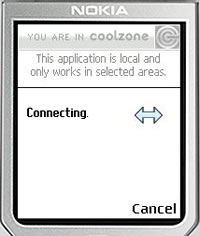 Today Nokia announced CoolZone, a Bluetooth-based distribution system that lets mobile phone users locally browse, pay for and download content on their mobiles while they are in shops supporting it.
Today Nokia announced CoolZone, a Bluetooth-based distribution system that lets mobile phone users locally browse, pay for and download content on their mobiles while they are in shops supporting it.
When entering a CoolZone, the mobile user can download an application, customised for the retailer or service provider. Through this they can browse and download music, ringtones, wallpapers and videos which can be DRM protected. Paying for the content will be done at the shops till or using premium-rate SMS.
Firmly throwing the ‘retail opportunity’ language switch to on Sakari Kotola, Director, Nokia Ventures Organization said “Rich digital content is widely available and requires an efficient distribution channel. Local mobility solutions create new types of business possibilities to individuals, location owners and enterprises. CoolZone is a Bluetooth technology based content distribution system available to any retailer or location owner who wants to offer or sell digital content to their customers, and thus enhance the in-store experience,”
CoolZone is the short hand term to describe the Nokia Local Content Channel Solution. This consists of client software for the phone (Symbian client for Series 60, Java for Nokia Series 40 and other manufacturers’ phones), a small multiradio Nokia Service Point (LCP10) installed in each service location and the Nokia Service Manager (LCM10) for centrally managing the service points and the content. While the service is currently Bluetooth based, WLAN will be one of expected additions in the near future, as more phones will offer WLAN capability.
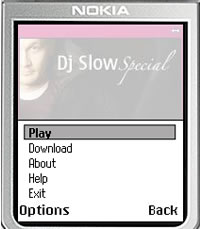 As the user of the service needs the user to download an application to use the service, we can imagine little hacking groups are already forming plans to hang around near these shops offering their own ‘applications’ with similar names to unsuspecting, or inexperience users.
As the user of the service needs the user to download an application to use the service, we can imagine little hacking groups are already forming plans to hang around near these shops offering their own ‘applications’ with similar names to unsuspecting, or inexperience users.
While see this as a good step forward as a new ways distributing content – frankly we’re surprised it’s taken so long to come to reality, we’d thought of it years ago – it’s acceptance among retailers will depend on the financial deal for the operators of these shops. Any retailer considering this will need to realise that anyone in their shop using this service will not be looking at the goods on their shelves when they’ve got their face stuck in their mobile, figuring out which tracks they want to download.
This could go some way to explain why the first limited trial is publicly available at three Free Record Shop music stores and three Rober’s Coffee cafés in Helsinki area, Finland – they have no conflict of interest.
It may be that the slight headless-chicken-mode surrounding digital music current – as those who don’t really understand what is happening but are wowed by the huge growth of iPod – will lead the retailers to blindly jump forward to have CoolZones on their premises.
CoolZone will also be demonstrated at the Nokia Mobility Conference 2005 in Palau de Congressos de Catalunya, Barcelona, Spain during November 2-3, 2005 with content from EMI.
 Nestled down low in the small print of an advert for some HP servers which run unix/Windows and Linux, the following text can be found
Nestled down low in the small print of an advert for some HP servers which run unix/Windows and Linux, the following text can be found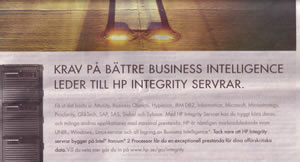 Quite who originally spotted this blunder in the small print, isn’t known, but we suspect that it’s someone with a very keen eye for detail – verging on the fanatical.
Quite who originally spotted this blunder in the small print, isn’t known, but we suspect that it’s someone with a very keen eye for detail – verging on the fanatical.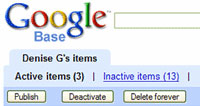 The web wires are waxing wildly with rumours about Google Base, a hush-hush Google project that “accidentally” appeared on the Web for a few hours yesterday.
The web wires are waxing wildly with rumours about Google Base, a hush-hush Google project that “accidentally” appeared on the Web for a few hours yesterday.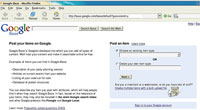 Under pressure from bloggers, Google company product manager, Tom Oliveri, revealed a little in his blog:
Under pressure from bloggers, Google company product manager, Tom Oliveri, revealed a little in his blog: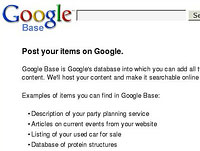 The screenshots revealed an entry page where Google suggests the type of information to submit to Base, with one sharp eyed Dutch blogger
The screenshots revealed an entry page where Google suggests the type of information to submit to Base, with one sharp eyed Dutch blogger 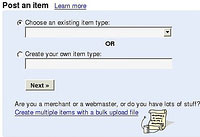 This service would let individual punters submit classified adverts for free on Google Base and could possibly signal the imminent arrival of the much rumoured Google Payment (aka Google Wallet) product.
This service would let individual punters submit classified adverts for free on Google Base and could possibly signal the imminent arrival of the much rumoured Google Payment (aka Google Wallet) product. BSkyB’s Director of Product Management, Gerry O’Sullivan couldn’t help sounding smug as he took centre stage at The Connected Home conference in London today.
BSkyB’s Director of Product Management, Gerry O’Sullivan couldn’t help sounding smug as he took centre stage at The Connected Home conference in London today. While Microsoft’s Cynthia Crossley and Telewest’s Mark Horley nodded collaboratively to Merlin Kister of Intel’s assertion that “We mustn’t be close minded and pick a winner. It’s important for all players to work together,” O’Sullivan looked disinterested.
While Microsoft’s Cynthia Crossley and Telewest’s Mark Horley nodded collaboratively to Merlin Kister of Intel’s assertion that “We mustn’t be close minded and pick a winner. It’s important for all players to work together,” O’Sullivan looked disinterested. “There’s zero tolerance (among our customers) for that sort of unreliability and pain…we can only roll out products that you switch on and they work.”
“There’s zero tolerance (among our customers) for that sort of unreliability and pain…we can only roll out products that you switch on and they work.” Horley mentioned that Telewest was launching its own 160GB PVR in early 2006, with the WHOLE disc available for recording “as we already offer video on demand”.
Horley mentioned that Telewest was launching its own 160GB PVR in early 2006, with the WHOLE disc available for recording “as we already offer video on demand”. The futuristic vision of a connected home with content moving seamlessly from our TV to our PC and on to our mobile device is still a long way off, according to key speakers at The Connected Home conference in London today.
The futuristic vision of a connected home with content moving seamlessly from our TV to our PC and on to our mobile device is still a long way off, according to key speakers at The Connected Home conference in London today. It took Dimitri Van Kets (pictured left), from Belgian telco, Belgacom, to voice what many were thinking by announcing that the networked home was “little more than a mass of standards” and “too confusing” for the average consumer. Unless the service providers get together and educate customers, he said, true home connectivity was never going to happen.
It took Dimitri Van Kets (pictured left), from Belgian telco, Belgacom, to voice what many were thinking by announcing that the networked home was “little more than a mass of standards” and “too confusing” for the average consumer. Unless the service providers get together and educate customers, he said, true home connectivity was never going to happen. Paul Szucs of Sony said that service providers should “try not to lose the plot with content protection”, adding that “consumers simply want their devices to work together and share content.”
Paul Szucs of Sony said that service providers should “try not to lose the plot with content protection”, adding that “consumers simply want their devices to work together and share content.”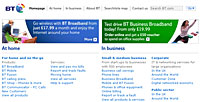 BT is planning to turbo-boost broadband connectivity by quadrupling basic connectivity speeds to 8mbps nationwide and giving the service a snappy name, “ADSL Broadband Max”.
BT is planning to turbo-boost broadband connectivity by quadrupling basic connectivity speeds to 8mbps nationwide and giving the service a snappy name, “ADSL Broadband Max”.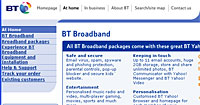 The 8mbps service will see BT reaching the theoretical top ADSL speeds it announced when the broadband service first launched in 2000.
The 8mbps service will see BT reaching the theoretical top ADSL speeds it announced when the broadband service first launched in 2000. With the industry rapidly consolidating, BT is coming under increasing pressure from newly merged uber-telecos like Telewest/NTL and Sky/Easynet, with the former already offering speeds of more than 8mbps for no extra charge on existing broadband subscriptions.
With the industry rapidly consolidating, BT is coming under increasing pressure from newly merged uber-telecos like Telewest/NTL and Sky/Easynet, with the former already offering speeds of more than 8mbps for no extra charge on existing broadband subscriptions. Elsewhere, BT has started trialling optical fibre broadband services in Wales, connecting business to ultra-high-bandwidth services using strands of blown fibre run along using existing telegraph poles.
Elsewhere, BT has started trialling optical fibre broadband services in Wales, connecting business to ultra-high-bandwidth services using strands of blown fibre run along using existing telegraph poles. More details about Jason Tomczak’s class action against Apple for releasing defective iPod Nanos have emerged on The Inquirer’s site.
More details about Jason Tomczak’s class action against Apple for releasing defective iPod Nanos have emerged on The Inquirer’s site.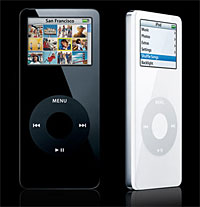 The plaintiff alleges that with Steve Jobs whipping the Nano out of his pocket in a TV advert, Apple led consumers to believe the machine was durable.
The plaintiff alleges that with Steve Jobs whipping the Nano out of his pocket in a TV advert, Apple led consumers to believe the machine was durable. Ironically, things haven’t been helped by the iPod nano appearing on the scene straight after the phone’s launch, with the ultra-small pocket rocket holding 10 times the amount of songs for half the price
Ironically, things haven’t been helped by the iPod nano appearing on the scene straight after the phone’s launch, with the ultra-small pocket rocket holding 10 times the amount of songs for half the price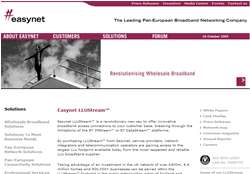 As we reported last week, Easynet has been bought by Sky – as long as they get shareholder approval, but since Sky have offered a premium on Easynet’s shares, this should be a done deal.
As we reported last week, Easynet has been bought by Sky – as long as they get shareholder approval, but since Sky have offered a premium on Easynet’s shares, this should be a done deal. Even though Sky are buying into LLU, Easynet only cover around 250 exchanges and currently all the voice goes to BT (Easynet use the shared metallic path LLU option), while Sky are likely to want to take the phone service as well (they already have a SkyTalk package using CPS provided by THUS). Sky will need to invest to make this a reality as well as increasing Easynet’s coverage. They have said they want to go into around 1000 exchanges, so that’s a build out of around 750 – which won’t be cheap (probably another £100m’ish at least).
Even though Sky are buying into LLU, Easynet only cover around 250 exchanges and currently all the voice goes to BT (Easynet use the shared metallic path LLU option), while Sky are likely to want to take the phone service as well (they already have a SkyTalk package using CPS provided by THUS). Sky will need to invest to make this a reality as well as increasing Easynet’s coverage. They have said they want to go into around 1000 exchanges, so that’s a build out of around 750 – which won’t be cheap (probably another £100m’ish at least). If all the LLU players aggregated infrastructure and competed on services, they could build a 21CN of their own now. LLU competition is going to be fiercely competitive with Wanadoo, AOL, Sky and even Be offering a triple-play – all competing for the same customers. – as well as BT (who will have nationwide coverage) and not ignoring NTL/Telewest who are also going into LLU.
If all the LLU players aggregated infrastructure and competed on services, they could build a 21CN of their own now. LLU competition is going to be fiercely competitive with Wanadoo, AOL, Sky and even Be offering a triple-play – all competing for the same customers. – as well as BT (who will have nationwide coverage) and not ignoring NTL/Telewest who are also going into LLU.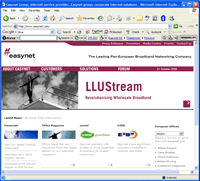 Sky will gain income from broadband subscription and possibly entice further subscribers to their TV service taking them to their stated aim of 10m. Far more important is a new channel to deliver content through – one they have total control over. They like that.
Sky will gain income from broadband subscription and possibly entice further subscribers to their TV service taking them to their stated aim of 10m. Far more important is a new channel to deliver content through – one they have total control over. They like that. Wi-Fly
Wi-Fly Is it a bird, is it a plane…
Is it a bird, is it a plane…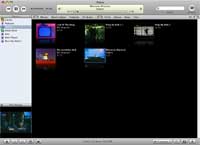 Oooh Aaargh, ‘cos we’re pirates!
Oooh Aaargh, ‘cos we’re pirates!